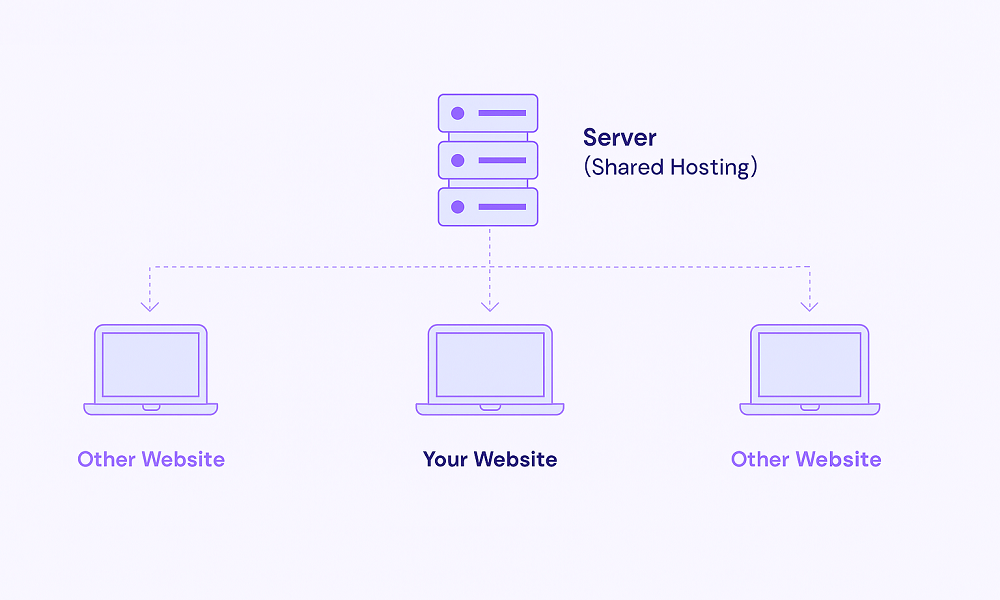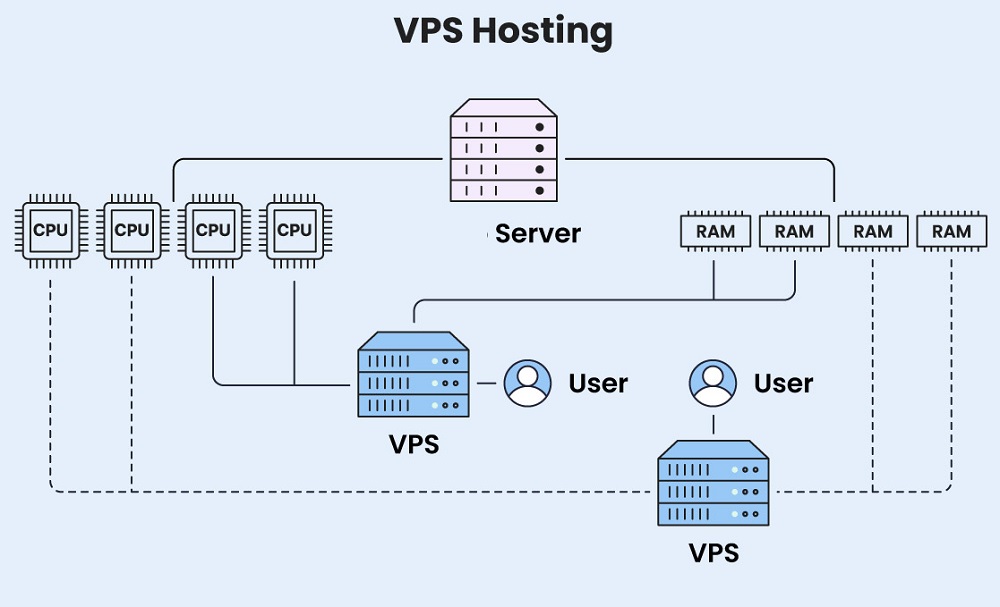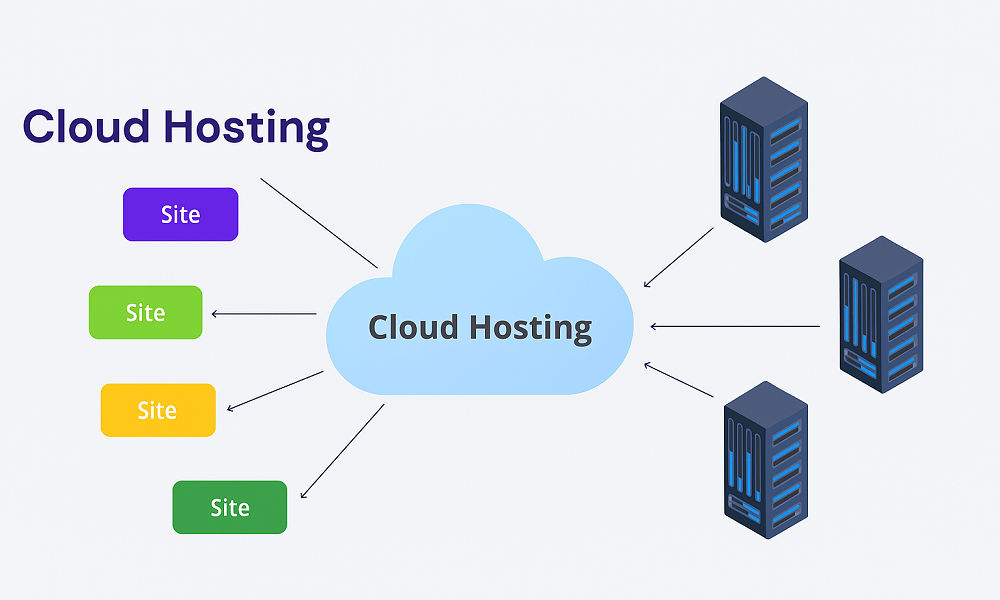Choosing the right hosting solution is one of the most important decisions you’ll make when launching a website. Whether you’re a solo blogger, a growing business, or an established brand, the type of server you choose will directly impact your website’s speed, security, scalability, and cost.
In this guide, we’ll explain the key differences between Shared Hosting, VPS Hosting, and Cloud Hosting—and help you figure out which one best fits your needs.
What Is Shared Hosting?
Shared hosting is the most common and beginner-friendly hosting type. In a shared environment, your website resides on a server alongside many others. All sites share the same resources—CPU, memory, storage, bandwidth, etc.
Shared hosting is like living in a dorm room with many roommates. Everyone shares the same bathroom, WiFi, and air conditioning. If one person uses up too much internet (for example, streaming HD videos all day), the others will experience slower speeds.

Who It’s For:
- Beginners launching their first blog or portfolio
- Small personal websites
- Budget-conscious users
Pros:
- Very affordable (starts at $2–$5/month)
- Easy to set up with one-click installers (e.g., WordPress)
- No technical expertise required
Cons:
- Performance may suffer if other sites on the server use too many resources
- Limited customization or control
- Not ideal for high-traffic or resource-heavy websites
What Is VPS Hosting?
VPS (Virtual Private Server) hosting offers a middle ground between shared and dedicated servers. A VPS uses virtualization technology to divide a single physical server into multiple virtual environments. Each VPS has dedicated resources and full control over its settings.
VPS hosting is like having your own apartment within an apartment building. You have your own private space (dedicated CPU, RAM, storage) and can decorate it however you want (install any software or customize settings). Even though others live in the building, what they do doesn’t affect you.

Who It’s For:
- Bloggers or businesses experiencing growing traffic
- Developers or users who need server-level control
- Medium-sized eCommerce stores or apps
Pros:
- Dedicated resources (RAM, CPU, disk space)
- Root access and server customization
- More stable and secure than shared hosting
Cons:
- Slightly more expensive (starts at $10–$50/month)
- Requires some technical knowledge
- Not as scalable as cloud hosting
What Is Cloud Hosting?
Cloud hosting uses a network of interconnected servers (the “cloud”) to host your website. Instead of relying on a single machine, your site pulls resources from a cluster, ensuring high availability and flexibility.
Cloud hosting is like staying at a chain of luxury hotels across the country. Your “room” isn’t tied to just one building. If one hotel has a problem, you’re automatically moved to another hotel without any interruption. It’s highly flexible and always available.

Who It’s For:
- Businesses needing high uptime and scalability
- Web applications with unpredictable traffic
- SaaS platforms, startups, and international businesses
Pros:
- Excellent scalability—you can increase or decrease resources on demand
- High uptime due to server redundancy
- Pay-as-you-go pricing models
Cons:
- Higher cost over time (depending on usage)
- Can be complex for beginners
- Often involves metered billing
Side-by-Side Comparison Table
| Feature | Shared Hosting | VPS Hosting | Cloud Hosting |
| Resource Allocation | Shared with others | Dedicated (virtual) | Dynamic, from cluster |
| Performance Stability | Low | Medium-High | High |
| Security | Basic | Stronger isolation | Very high |
| Control/Customization | Very limited | Full root access | Varies (usually partial) |
| Scalability | Not scalable | Manual upgrade needed | Instantly scalable |
| Price Range | $2–$5/month | $10–$50/month | $15–$100+/month |
How to Choose the Right Hosting for You
Here’s a quick breakdown based on your profile:
- Just starting out? Go with Shared Hosting for its simplicity and low cost.
- Expecting growth or need flexibility? Choose VPS Hosting for better control and stability.
- Running a serious business or app? Opt for Cloud Hosting to ensure performance, scalability, and availability.
Real-World Use Cases
| User Type | Recommended Hosting | Why |
| Personal blogger | Shared Hosting | Low traffic, low budget |
| Web developer | VPS Hosting | Needs custom server setup |
| Online store (small) | VPS Hosting | More traffic, security is key |
| Large-scale SaaS startup | Cloud Hosting | Must scale fast and avoid downtime |
| Event site with spikes | Cloud Hosting | Handles unpredictable surges well |
Final Thoughts
Your hosting solution isn’t just about storage and bandwidth—it’s about your website’s stability, growth, and potential. Understanding the difference between shared, VPS, and cloud hosting can help you make the best choice not just for today, but for where your website is headed tomorrow.
